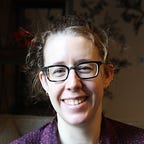From Sociologist to Data Scientist: My Journey through a Data Science Bootcamp
If you’re reading this, chances are you’ve arrived here because you’ve asked yourself one of several questions along the lines of “what am I doing with your life”, “am I in the right career”, or, more specifically, “should I make a switch to data scientist?” These are questions that only you can answer at the end of the day. But if my story helps you on your journey, no matter the direction, then I am glad.
Like a fair number of high schoolers, I had no idea what I wanted to do with my life. So off I went to college, still not knowing. My budget was tight — I had to be out in four years — I just couldn’t afford to be a five year senior so I picked something that I enjoyed from my General Education requirements — Sociology — and just went with it. And boy was it fun. I studied Criminology, Juvenile Delinquency, Families, you name it. It was a blast trying to understand the influence of society on human behavior.
Some of my professors took an interest in me and encouraged me to continue my studies by applying to grad school and so I did. I was accepted into Bowling Green State University just outside of Toledo, Ohio to study Sociology with a focuses on Juvenile Delinquency and Criminology. It was here where I was formally introduced to all things data — cleaning, scaling and transforming, analyzing, presenting and all the computer programming that went along with it. I was hooked even more than before. I loved digging into the guts of a good dataset — it was serene and almost meditative and I was at my happiest doing all things data. While SAS was the language of choice, I also learned Stata and some SPSS.
The further I went in my graduate studies, however, the less appealing the prospect of being an academic became. I knew my passion for data and programming, while still used, would need to take a back-burner to other duties. I couldn’t bear the thought of programming and data not being primary parts of my day so I made a switch and accepted employment with a survey research firm in Chicago, Illinois.
I began my tenure working in survey management but eventually made a lateral move to a more data-focused role on a large-scale on-going public health data collection effort. In this role, I spent a large amount of my time working as a member of a data quality and cleaning team. But the methods were set in stone and there was no real room for creative input or finesse. I continued to manage data cleaning efforts until the self-realization that I would no longer grow in my position or provide meaningful insights from the data whose quality I worked so hard to maintain and improve.
So I took the plunge and left a cushy job with a nice cubicle overlooking Lake Michigan and Grant Park to become a web developer. It was all programming, all the time — solving problems, being creative, organizing back-end data. I was nearly fulfilled. Nearly. The fulfil-o-meter was around 80 percent. And did I ever miss working with all things data! So I took another step and here I am, a full-blown Data Scientist. A Data Scientist who got here by way of web development by way of survey research by way of academia and I couldn’t be happier. I made the right decision for me — the choice to become a Data Scientist.
But if you’re sitting there wondering, “gee, that’s great, but how the heck does this help me?” That’s a very valid point. For me, I took inventory of my experiences and skills — what did I like and not like, what was I good at, what did I want to be good at. It may sound silly, but make that pros and cons list. Look back at your career and life experiences and really examine it. And be honest with yourself when it comes to what you do and don’t like. And perhaps most importantly, it’s not too late to make a switch and if at first you don’t succeed in finding career fulfillment, pick yourself up, dust yourself off and try again.
